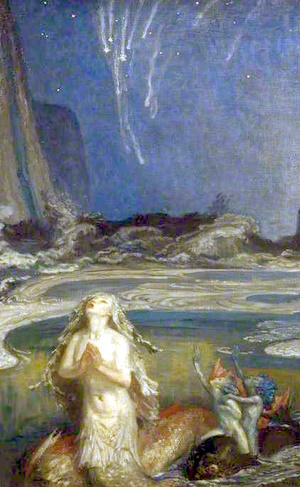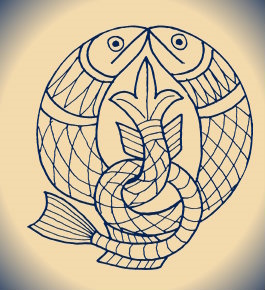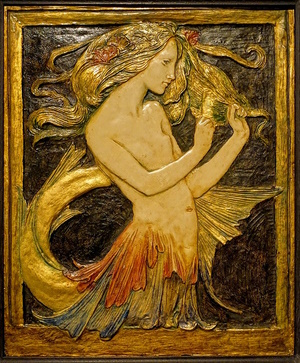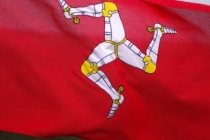Teeval, Princess of the Ocean (Teeval, Ben-Phrinse Ny Marrey) - Manx Fairy Tale

IN the old days Culain, the smith of the gods, was living in the Isle of Mann. It was the time when Conchubar was at the court of the King of Ulster, and had nothing but the sword in his hand. He was a fine handsome young man, and he had made up his mind to make himself a king. So he went one day to the Druid of Clogher to ask him what he had best do.
(Ayns ny shenn laghyn va Culain, gaaue ny jeeghyn, cummal ayns Mannin. Ec y traa shen va Conchubar ec cooyrt Ree Ullee, as cha row red erbee echey agh y cliwe v’ ayns e laue. V’eh ny ghooinney aeg, braew as bwaagh, as va’n aigney echey slane soit er jannoo eh hene ny ree. Myr shen, laa dy row, hie eh dys Druaight Chlogher dy vriaght jeh cre lhisagh eh jannoo).
‘Go thy way,’ said the Druid, ‘to the Isle of Mann. There thou wilt find the great smith Culain. Get him to make thee a sword and a spear and a shield, and with these thou shalt win the kingdom of Ulster.’
(‘Immee royd,’ dooyrt yn Druaight ‘dys Mannin. Ayns shen yiow oo yn gaaue mooar Culain. Cur ersyn jannoo cliwe as shleiy as scape dhyts, as lhieusyn cossynee oo reeriaght Ullee.’)
Conchubar went away, and hired a boat and put out to sea. He landed in Mann and made straight for Culain’s smithy. It was night when he got there, and the red glow of the furnace shone out into the dark. He could hear from inside the smithy the roar of the bellows and the clanging of the hammer on the anvil. When he came near, a great dog, as large as a calf, began to bay and to growl like thunder, and brought his master out.
(Hie Conchubar ersooyl as ren eh failley baatey as hie eh roish er y cheayn. Haink eh er thalloo ayns Mannin as hie eh çhelleeragh lesh keirdee Chulain. Va’n oie ayn tra raink eh, as va bree jiarg yn ‘urnish ry akin soilshean sy dorraghys. Cheayll eh voish çheu sthie y cheirdee garveig ny builg-heidee as clingal yn oard er yn ingan. Tra haink eh faggys da, ghow moddey mooar, cho mooar as lheiy, toshiaght er gullarnee as gyrnal gollrish taarnagh, as hug eh lesh e vainshtyr magh.)
‘Who art thou, young man? ‘ said he.
(‘Quoi shiu hene, ghooinney aeg?’ dooyrt eh.)
‘Oh Culain!‘ cried Conchubar, ‘it is from the Druid of Clogher that I come, and he bade me ask thee to make me a sword and a spear and a shield, for only with weapons of thy making can I win the Kingdom of Ulster.’
(‘Oh Chulain!’ dyllee Conchubar, ‘She voish Druaight Chlogher ta mee çheet, as hug eh sarey dou mish dy hirrey ort dy yannoo dou cliwe as shleiy as scape, er yn oyr nagh voddym cosney Reeriaght Ullee agh lesh wappinyn jeant ayd.’

Culain’s face grew black at first, but after he had gazed for a while at Conchubar, he saw that he had the look about him of one who would go far, and he said:
(Hoshiaght haint eddin Chulain dy ve doo, agh lurg da blakey er Conchubar rish tamylt, honnick eh dy row ersyn cummey peiagh ennagh ragh er y hoshiaght, as dooyrt eh:)
‘It shall be done for thee, but thou must wait, for the work is long.’
(‘Nee’m dhyts eh, agh shegin dhyt fuirraghtyn, er yn oyr dy vel yn obbyr liauyr’)
So Culain began to make the weapons, and Conchubar waited in the island.
(Myr shen ghow Culain toshiaght er jannoo ny wappinyn, as duirree Conchubar er yn ellan.)
Early one brave morning in May when the sun had just risen over Cronk-yn-Irree-Laa, he was walking on the strand, wondering to himself how much longer Culain would be making his weapons and thinking it was full time for him to return. The tide was going out, and the sun was shining on the wet sand. Suddenly he saw something flashing at the edge of the waves a few paces from him. He ran up to it and, behold, it was the most beautiful woman he had ever put sight on, fast asleep. Her hair was golden, like the gorse in bloom; her skin whiter than the foam of the sea, her lips red as the coral, and her cheeks rosy like the little clouds that were flying before the face of the rising sun. The fringe of her dress of many coloured seaweeds rose and fell with the ebb and flow of the waves. Pearls gleamed on her neck and arms. Conchubar stood and looked on her. He knew that she was a Mermaid and that as soon as she awoke she would slip back into the ocean and be lost to him. So he bound her fast with his girdle.
(Dy moghey moghrey braew dy row ayns Boaldyn tra va’n grain kiart er n’iree erskyn Cronk yn Iree Laa, v’eh shooyl er y traie smooinaghtyn da hene caid ny sodjey veagh Culain jannoo e wappinyn as dy by chair dy goll er ash dy valley. Va’n tidey traih, as va ghrian soilshean er y gheinnagh fliugh. Dy doaltattym honnick eh red ennagh falleayssaghey ec oirr ny tonnyn kuse veg dy chesmadyn voyd. Roie eh huggey as, cur-jee my ner, she yn ven s’aaley v’eh rieau er nakin v’ayn, trome ny cadley. Va folt airhoil eck gollrish yn aittin my vlaa; va’n crackan eck ny s’baney na’n varrag, va ny meillyn eck cho jiarg as yn corryl, as va ny lieckanyn eck ruissagh gollrish ny bodjallyn beggey va getlagh roish eddin ny greiney irree. Va çhemmal e gooyn jeant jeh famlagh daahoil va goll seose as sheese er ny tonnyn. Va pearlyn soilshean er e mwannal as roihaghyn. Hass Conchubar as yeeagh eh urree. Va fys echey dy row ee ny Ben varrey as dy ragh ee er ash stiagh syn ‘aarkey cho leah as ghooishtagh ee as dy gaillagh eh ee. Myr shen, chiangle eh ee dy çhionn lesh e chryss.)
Then she awoke and opened her eyes, which were blue as the sea, and when she saw that she was bound, she cried out with terror, ‘Loose me, man, loose me!’
(Eisht ghooist ee as doshil ee e soillyn, va cho gorrym as y keayn, as tra honnick ee dy row ee kianglt, dyllee ee magh lesh aggle, ‘Lhig yn raad dou, whooiney, lhig yn raad dou!’)
Conchubar did not answer, so she said again, ‘Loose me, I beg thee!’ in a voice as sweet as the music of Hom Mooar, the Fairy Fiddler.
(Cha dreggyr Conchubar, as myr shen dooyrt ee reesht, Lhig yn raad dou, ta mee guee ort!’ lesh coraa cho millish as kiaull Hom Mooar, yn Fiddleyr Shee.)

By this time Conchubar was feeling that he would give all he had to keep her. He answered, trembling, ‘Woman, my heart, who art thou?’
(Nish va Conchubar smooinaghtyn dy derragh eh ooilley ny v’echey dy ‘reayll ee. As eh er creau, dreggyr eh, ‘Ven, my chree, quoi uss?’)
‘I am Teeval, Princess of the Ocean,’ said she. ‘Set me free, I pray thee.’
(Mish Teeval, Ben-phrinse yn ‘aarkey,’ dooyrt ee. ‘Feayshil mee, my sailt.’)
‘But if I set thee free,’ said Conchubar, ‘thou wilt leave me.’
(‘Agh my ‘eayshilym uss,’ dooyrt Conchubar, ‘faagee oo mish.’)
‘I cannot stay with thee, Conchubar,’ she cried; ‘set me free, and I will give thee a precious gift.’
(‘Cha noddym tannaghtyn mayrt, Conchubar,’ dyllee ee; ‘feayshil mee, as verym dhyt gioot braew.’)
‘I will loose thee,’ answered Conchubar. ‘It is not for the gift, but because I cannot resist thee.’
(‘Feayshilym oo’ dreggyr Conchubar. ‘Cha nee kyndagh rish yn ghioot, agh er yn oyr nagh noddym shassoo dt’oi.’)
He unfastened the girdle from her and she said, ‘My gift to thee is this: Go now to Culain who is makng thy shield, and tell him that Teeval, Princess of the Ocean, bids him to put her figure on the shield and round it to grave her name. Then thou shalt wear it always in battle, and when thou shalt look on my face and call my name, thy enemies’ strength shall go from them and shall come into thee and thy men.’ When she had said this, she waved her white arm to Conchubar and plunged into the waves. He looked sadly for a long time at the spot where she had disappeared, and then walked slowly to the forge of Culain, and gave him the message.
(Deayshil eh yn chryss voee as dooyrt ee, ‘Shoh my gioot dhyt: Imee royd nish dys Culain ta janoo dty scape as insh da dy vel Teeval, Ben-phrinse ny Marrey, cur sarey da eh dy chur e cummey er yn scape as mygeayrt-y-mysh dy ghrainnaghey yn ennym eck. Eisht ceauee oo eh dy kinjagh ayns caggey, as tra yeeaghys oo er my eddin as yllys oo my ennym, hed niart dty noidyn voue as hig eh stiagh aynyd as ayns dty gheiney.’ Tra v’ee er ghra shoh, chrie ee e roih vane gys Conchubar as hum ee stiagh ayns ny tonnyn. Yeeagh eh dy trimshagh rish tammylt liauyr er y voayl raad v’ee er skellal ersooyl, as eisht hooill eh dy moal dys keirdee Chulain, as hug eh da yn çhaghteraght.)
Culain finished the mighty shield as the Princess had said, and forged also for Conchubar a golden-hilted magic sword, and a spear set with precious stones. Then Conchubar, in his crimson mantle and white gold-embroidered tunic, and armed with his great shield and his mighty weapons, went back to Ireland.
(Hug Culain jerrey er y scape mooar myr va’n Ven-phrinse er gra, as woaill eh magh neesht da Conchubar cliwe obbee as cass airhey echey, as shleiy soit lesh cliejeenyn. Eisht hie Conchubar er ash dys Nerin, ceau e chloagey scarleod as e chassag vane laatchit lesh airh, as eillit lesh e scape mooar as e wappinyn pooaral.)
All that the Princess of the Ocean had said came true. When he went into battle he looked at the beautiful face in his shield and cried, ‘Help, Teeval.’
(Haink ooilley ny va Ben-phrinse ny Marrey er ghra dy ve firrinagh. Tra hie eh dy chaggey, yeeagh eh er eddin aalin er e scape as dyllee eh, ‘Cooin Lhiam, Heeval.’
Then he felt strength come into him like the strength of a giant, and he cut his enemies down like grass. Before long he was famous all over Ireland for his great deeds, and in the end he became King of Ulster. Then he invited Culain to come and live in his kingdom, and gave him the plain of Murthemny to dwell in.
(Eisht dennee eh niart çheet stiagh aynym gollrish niart foawr, as lhieg eh e noidyn gollrish faiyr. Roish foddey v’eh ardghooagh feie Nerin kyndagh rish ny reddyn mooarey jeant echey, as fy yerrey haink eh dy ve Ree Ullee. Eisht hug eh cuirrey da Culain dy heet as dy hannaghtyn ayns e reeriaght, as hug eh da strah Vurthemney dy chummal ayn.)
But he never again saw the lovely Mermaid.
(Agh cha vaik eh yn Ven varrey aalin arragh.)
Source: Source: Sophia Morrison - Manx Fairy Tales, London 1911 and Skeealyn Mooinjer Veggey Vannin (2008)
Images:
Mermaid and Sea by Robert Anning Bell (1863–1933) credit Victoria Art Gallery.
The Mermaid - by Robert Anning Bell. Exhibit in the Montreal Museum of Fine Arts - Montreal, Quebec, Canada.
Content type:
- Manx
Language:
- English






